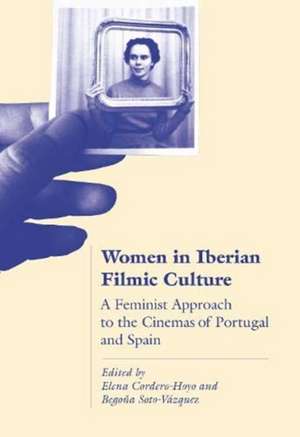Women in Iberian Filmic Culture: A Feminist Approach to Cinemas in Portugal and Spain
Editat de Elena Cordero Hoyo, Begoña Soto Vásquezen Limba Engleză Paperback – 19 iun 2020
Focusing on Portuguese and Spanish cinema, this collection brings together research about women and their status in relation to Iberian visual culture. The volume contributes to ongoing debates about the position of women in the cinemas of Portugal and Spain through a revision of feminist theory as well as new accounts of film history. It also aims to promote comparisons between Iberian cinemas and visual culture from different regions, a topic that is almost unexplored in academia, despite the similar histories of the two Iberian countries, particularly throughout the twentieth century.
Preț: 221.00 lei
Preț vechi: 276.24 lei
-20% Nou
Puncte Express: 332
Preț estimativ în valută:
42.29€ • 44.27$ • 34.99£
42.29€ • 44.27$ • 34.99£
Carte indisponibilă temporar
Doresc să fiu notificat când acest titlu va fi disponibil:
Se trimite...
Preluare comenzi: 021 569.72.76
Specificații
ISBN-13: 9781789381719
ISBN-10: 1789381711
Pagini: 238
Ilustrații: 14 halftones
Dimensiuni: 171 x 241 x 15 mm
Greutate: 0.41 kg
Ediția:1
Editura: Intellect Ltd
Colecția Intellect Ltd
ISBN-10: 1789381711
Pagini: 238
Ilustrații: 14 halftones
Dimensiuni: 171 x 241 x 15 mm
Greutate: 0.41 kg
Ediția:1
Editura: Intellect Ltd
Colecția Intellect Ltd
Notă biografică
Elena Cordero Hoyo is an editor of Secuencias, an online film history journal. Begoña Soto-Vázquez is professor of media history and cinema theory at the Universidad Rey Juan Carlos in Spain and was the founder and director of the Film Archive of Andalucia.
Cuprins
Introduction: Women in Iberian cinemas, a singular tour in Spain and Portugal
Elena Cordero-Hoyo and Begoña Soto-Vázquez
Part 1: The presence of women in Iberian cinemas
Fiction as a Place of Power: The Presence of Female Directors Throughout the History of Portuguese Cinema.
Ana Catarina Pereira
The Invisible Women of Spanish Cinema.
Annette Scholz
Três dias sem Deus by Bárbara Virgínia, a Different Way of Representation.
Ricardo Vieira Lisboa
Part 2: Killing the muse: Women as creator
Gender Violence and Historical Memory in Margarida Cardoso and Isabel Coixet.
Estela Vieira
‘People Don’t Understand [the] World’: The Limits of Transnational Authorship in the Cinema of Isabel Coixet.
Katarzyna Paszkiewicz
Murmuring Colonial Ghosts in Margarida Cardoso’s Filmography.
Adriana Martins
Part 3: Beyond the author: Recognizing other cinematographic professions
Weaving a Cinematographic Culture and Writing about Film or How to Reconstruct the Subject of Women in Spanish Silent Cinema.
Begoña Soto-Vázquez
A Woman Censor during the Portuguese Dictatorship (1968–74).
Ana Bela Morais
Costume Designers in Portugal: A Trade Between Art and Technique Relegated to the Status of ‘a Woman’s Thing’.
Caterina Cucinotta
Part 4: Historical memory and the gendered archive
Paradigms – Women Filmmakers in 1970s Revolutionary Portugal – Delgado, Nordlund, Cordeiro and Serra.
Érica Faleiro Rodrigues
The Mother Awaits: Woman and Landscape in Galician Non-Fiction Cinema.
Mª Soliña Barreiro González
Exploring the Portuguese Memory through Appropriation Film: A toca do lobo (Mourão, 2015).
Elena Cordero-Hoyo
Notes on contributors
Elena Cordero-Hoyo and Begoña Soto-Vázquez
Part 1: The presence of women in Iberian cinemas
Fiction as a Place of Power: The Presence of Female Directors Throughout the History of Portuguese Cinema.
Ana Catarina Pereira
The Invisible Women of Spanish Cinema.
Annette Scholz
Três dias sem Deus by Bárbara Virgínia, a Different Way of Representation.
Ricardo Vieira Lisboa
Part 2: Killing the muse: Women as creator
Gender Violence and Historical Memory in Margarida Cardoso and Isabel Coixet.
Estela Vieira
‘People Don’t Understand [the] World’: The Limits of Transnational Authorship in the Cinema of Isabel Coixet.
Katarzyna Paszkiewicz
Murmuring Colonial Ghosts in Margarida Cardoso’s Filmography.
Adriana Martins
Part 3: Beyond the author: Recognizing other cinematographic professions
Weaving a Cinematographic Culture and Writing about Film or How to Reconstruct the Subject of Women in Spanish Silent Cinema.
Begoña Soto-Vázquez
A Woman Censor during the Portuguese Dictatorship (1968–74).
Ana Bela Morais
Costume Designers in Portugal: A Trade Between Art and Technique Relegated to the Status of ‘a Woman’s Thing’.
Caterina Cucinotta
Part 4: Historical memory and the gendered archive
Paradigms – Women Filmmakers in 1970s Revolutionary Portugal – Delgado, Nordlund, Cordeiro and Serra.
Érica Faleiro Rodrigues
The Mother Awaits: Woman and Landscape in Galician Non-Fiction Cinema.
Mª Soliña Barreiro González
Exploring the Portuguese Memory through Appropriation Film: A toca do lobo (Mourão, 2015).
Elena Cordero-Hoyo
Notes on contributors
